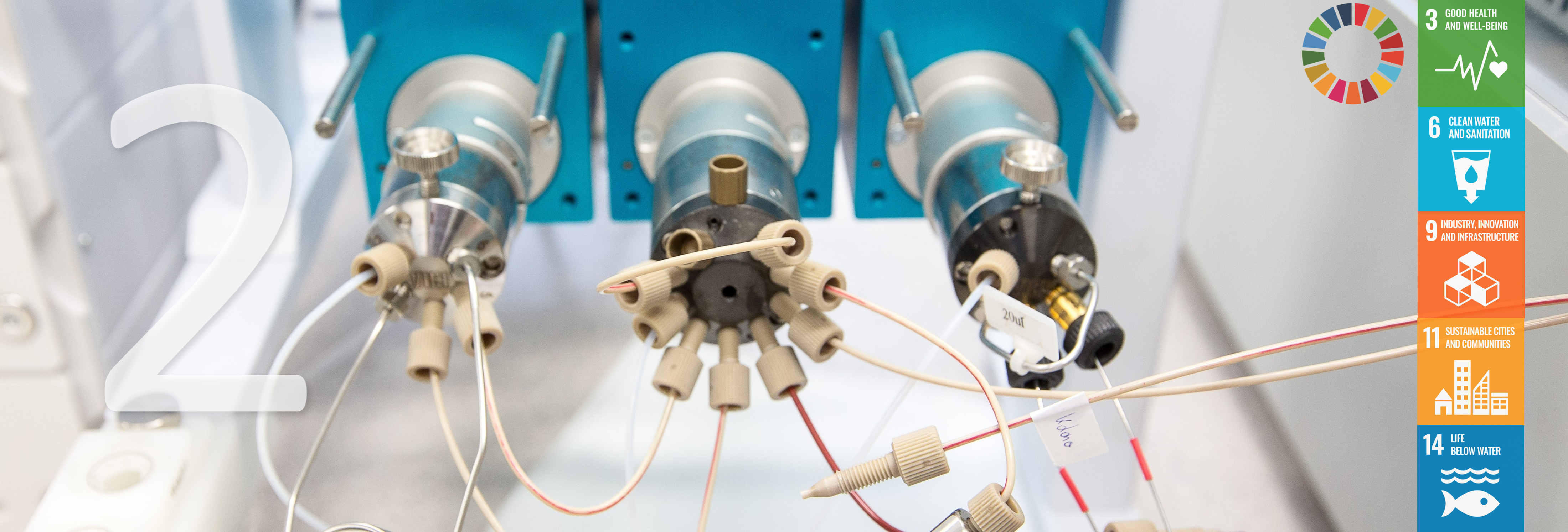“New” pollutants in the environment and their effect on freshwater ecosystems
Head of the research program: doc. Ing. Hana Kocour Kroupová, Ph.D.
The research team of the RP 2 consists of selected employees of three scientific laboratories of the FFPW USB, namely the Laboratory of Environmental Chemistry and Biochemistry, the Laboratory of Aquatic Toxicology and Ichtyopathology, the Laboratory of Machine Vision in Aquaculture and Water Protection.
Introduction
The presence of extraneous substances in the aquatic environment represents a significant factor influencing health status of aquatic organisms, including their natural reproduction and behaviour. A spectrum of chemical substances produced and used by people has constantly expanded. Significant sources of the environmental contamination are not only industrial activities and agricultural production, but also municipal waste waters. Despite the fact that these waters have been treated in waste water treatment plants in developed countries, it has been evident that existing technologies cannot eliminate a broad spectrum of extraneous compounds. These compounds, mainly human and veterinary pharmaceuticals (hormonal preparations, medicine lowering high blood pressure, antibiotics, antidepressants, analgesics, antirheumatics, antiepileptics, statins etc.), components of cosmetic products, perfumes, detergents etc. and their degradation products or metabolites (summarized as PPCP – Pharmaceuticals and Personal Care Products) get into the aquatic environment through 'treated' waste water discharged from waste water treatment plants where they can influence present organisms. Fate of these compounds in the waste water treatment plant technologies has not been sufficiently examined so far. The issue of PPCP in the aquatic environment has been currently one of the main topics of the world environmental research. More and more studies have emphasised the negative impact of extraneous substances originating from municipal waste waters on wild animals. The presence of PPCP and pesticides in drinking water has been proved even in drinking water. At present, there are basically no information concerning impacts of this type of contamination on entire ecosystems or trophic chains.
Vision
The vision of the research programme is to significantly contribute to improvement of the water quality and the aquatic environment in the Czech Republic by means of a multi-branch approach on the basis of the research team’s increasing know-how, its instrumental and experimental base and intensive cooperation with the research and application sphere, including the state administration.
Objective of the RP
The objective of the RP 2 is an excellent comprehensive research of fate of 'new' extraneous compounds in aquatic and soil environments and a critical assessment of their impacts on exposed organisms and communities. Unique findings from significant spheres of identification, occurrence, fate and comprehensive effects of extraneous compounds of the PPCP type, pesticides and their transformation products under real ecosystems conditions are be obtained throughout the RP 2. Thesenewly discovered findings have a key significance for economically meaningful strategic planning in the spheres of waste water treatment, drinking water treatment and landscape management. At the same time, modern methods for the use of passive samplers in the sphere of national monitoring programmes focused on contamination of the aquatic environment and effective analytical methods for monitoring of a wide spectrum of micropollutants in different components of the environment and in passive samplers are available for practice.
Results
The research team actively and regularly participated in the implementation of the national program for the monitoring of surface water quality, coordinated by the Czech Hydrometeorological Institute, and intensively cooperates with Povodí companies, wastewater treatment companies and drinking water treatment facilities in the field of micro-pollutant monitoring. Together with Norwegian (COWI) and Swedish (ExposMeter AB) partners, we have repeatedly succeeded in international tenders aimed at identifying new pollutants in environmental matrices.




